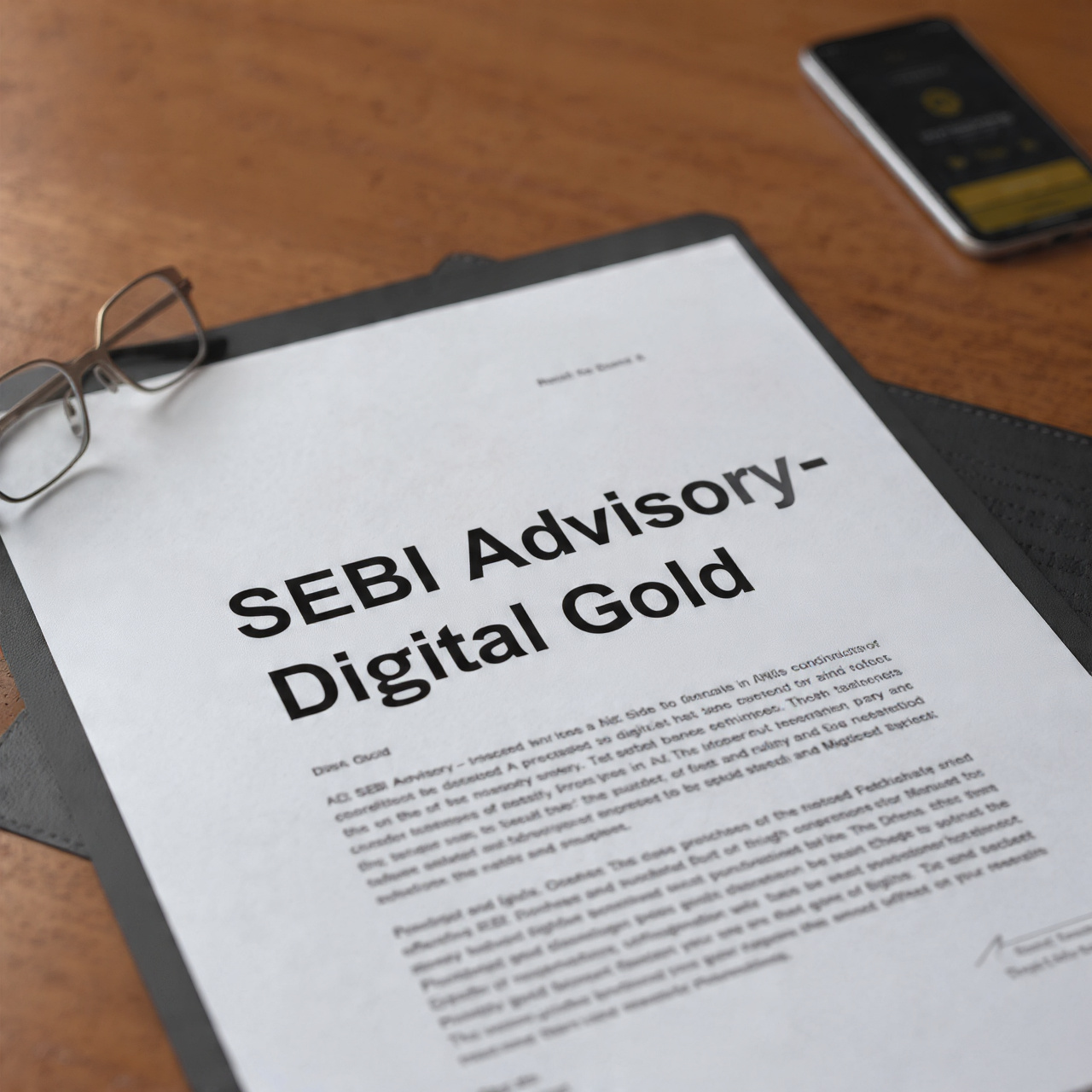Digital gold found widespread retail adoption in recent years, often through familiar fintech interfaces that conveyed a sense of safety. SEBI’s 8 November 2025 advisory clarifies that many of these products fall outside regulatory oversight. The caution is necessary, but its timing raises questions about anticipatory supervision and investor protection standards.
Gold continues to hold a unique position in India’s financial imagination. It is bought as a hedge, a store of value, and an emotional asset. Over the past few years, this traditional preference adapted to technology-enabled platforms in the form of digital gold—a product marketed as a convenient alternative to holding physical bullion. Users could invest as little as ₹100, track prices in real time, and redeem holdings at their discretion. The offering seemed consistent with the broader fintech-driven shift toward frictionless financial participation.
However, on 8 November 2025, the Securities and Exchange Board of India (SEBI) issued a public caution highlighting that several digital and online platforms selling digital gold products are doing so outside the regulatory perimeter. The advisory notes that while SEBI-regulated products such as Gold ETFs, Exchange-traded commodity derivatives, and Electronic Gold Receipts exist and are governed under established frameworks, many digital gold offerings “are neither notified as securities nor regulated as commodity derivatives. They operate entirely outside the purview of SEBI.”
SEBI further clarified that standard investor protection and grievance redressal mechanisms do not apply in such cases:
“None of the investor protection mechanisms under securities market purview shall be available for investments in such Digital Gold/E-Gold products.”
This is a significant and necessary disclosure. But it is also late.
When a Market Becomes Mainstream Before It Is Regulated
Digital gold adoption did not occur at the margins. It was promoted prominently during festive seasons, integrated into payment apps, and embedded within consumer-facing user journeys such as bill payments, wallets, and rewards programs. For many first-time investors, the presence of digital gold next to regulated instruments (such as mutual funds or direct equity SIPs) created an assumption of parity in regulatory status.
The scale of participation was not hidden from the regulator. Sales volumes, festive season campaigns, and fintech platform analytics were publicly visible for years. If digital gold products were always outside SEBI’s jurisdiction, why was that distinction not communicated earlier?
Regulatory silence in periods of market expansion often creates conditions where information asymmetry works against the retail participant. An advisory issued only after redemption delays, pricing disputes, and counterparty concerns have surfaced operates more as damage control than preventive guidance.
Why Retail Investors Found Digital Gold Attractive
Digital gold leveraged three behavioral advantages:
- Micro-purchases: The ability to buy in small denominations enabled participation without long-term planning.
- No Storage Burden: Vaulting and insurance were marketed as part of the product proposition, reducing perceived risk.
- Platform Trust Transfer: When sold on apps already used for UPI payments or investments, trust in the platform overshadowed the need to examine regulatory status.
In effect, convenience stood in for due diligence.
The Structural Risk: Unverified Custody
While regulated products such as Gold ETFs and Electronic Gold Receipts rely on audited custodial arrangements, many digital gold products depend on bilateral agreements between the platform, bullion supplier, and vaulting service providers. These are not standardized across the industry, nor are they publicly disclosed with consistent transparency.
This creates exposure to several risk factors:
- Counterparty risk (the platform or supplier’s solvency),
- Operational risk (mismanagement or inaccurate accounting),
- Redemption risk (restrictions, delivery delays, or quantity discrepancies).
The absence of a statutory dispute resolution mechanism is the core vulnerability. If a buyer contests their claim, no dedicated regulatory forum is obligated to intervene.
The Regulatory Dilemma
To be fair, SEBI’s jurisdiction is defined by statute. If digital gold is neither a security nor a commodity derivative, SEBI cannot unilaterally impose regulatory conditions. This raises a policy challenge:
Which institution should regulate digital gold — SEBI, RBI, or a new joint framework? Until such alignment is achieved, the space remains structurally exposed.
The Way Forward for Investors
Retail investors seeking gold exposure have three regulated alternatives:
| Product | Regulator | Key Feature |
| Sovereign Gold Bonds (SGBs) | RBI | Interest income + tax benefits |
| Gold ETFs | SEBI | Transparent pricing, exchange liquidity |
| Gold Mutual Funds | SEBI | SIP-based disciplined accumulation |
For those who value the option of physical redemption, Electronic Gold Receipts (EGRs) on recognized stock exchanges offer a regulated mechanism with verifiable underlying bullion.
If Already Holding Digital Gold on Unregulated Platforms
Investors should consider:
- Checking redemption terms and timelines immediately
- Downloading transaction histories and vaulting certificates
- Escalating unresolved complaints via consumer protection channels
Group representation or class action efforts may be more effective in cases of systemic provider failure.
The Institutional Lesson
Regulatory communication must be anticipatory, not retrospective.
Financial products that appear adjacent to regulated instruments in consumer platforms should not be allowed to occupy regulatory grey zones for prolonged periods. Coordinated oversight between SEBI, RBI and Ministry of Consumer Affairs may be necessary to prevent similar gaps across emerging digital asset categories.
Investor protection is not only about providing recourse when harm occurs.
It is also about ensuring clarity before participation begins.
#DigitalGold #SEBI #InvestorAwareness #GoldInvestment #MarketRegulation #FinTech #SGB #GoldETF #SmartInvesting #FinancialLiteracy #PolicyMatters


